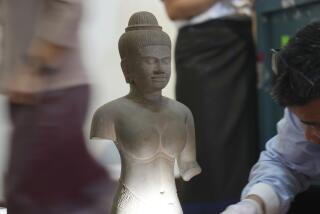Cambodia Says It Holds MIA Remains : Is Ready to Release Them but Premier Awaits U.S. Request
- Share via
PHNOM PENH, Cambodia — The Cambodian government has the remains of “quite a number” of American servicemen killed in the Indochina war, according to Premier Hun Sen.
“We are prepared to release them on the basis of humanitarianism,” the leader of the Vietnamese-backed Cambodian government said in an interview with The Times here this week.
Hun Sen also confirmed foreign and Cambodian news agency reports that his government is holding Sterling Brian Bono, a 35-year-old Coloradan, who he said was arrested in the western province of Battambang last May. “He is well. He is being held here in Phnom Penh,” the Cambodian leader said, the first official disclosure of Bono’s whereabouts and condition.
Then Hun Sen volunteered:
“We also have the bones of American MIAs. But no one has gotten in touch with us, so we have kept them. If the American government doesn’t come, there is nothing we can do about that. . . .
Won’t Bargain for Ties
“We are not going to use the cases to get them (the United States) to recognize us (the Phnom Penh regime) either de facto or de jure. “
The U.S. government does not recognize the Phnom Penh government, installed in early 1979 by a Vietnamese invasion that drove from power the brutal Khmer Rouge regime that controlled Cambodia from 1975 to 1979.
Nor does Washington have diplomatic relations with Vietnam, but the Hanoi government has turned over the remains of about 150 U.S. servicemen since the mid-1970s. On Thursday, an American delegation left Hanoi with three more sets of remains. In 1985, the Communist government of Laos, with which Washington maintains low-level relations, permitted a U.S. team to excavate the site of an Indochina war plane crash in search of others.
In Bangkok, Thailand, a U.S. Embassy spokesman Friday offered no immediate comment on Hun Sen’s claim to have remains of American servicemen, other than saying the information would be forwarded to Washington.
In total, more than 2,400 Americans were listed as missing in action during the fighting in Vietnam, Cambodia and Laos during the 1960s and 1970s. U.S. records show 83 servicemen missing in Cambodia, where American warplanes operated against Vietnamese and Cambodian Communist forces from 1969 to 1973 and U.S. ground troops took part in a two-month “incursion” in 1970.
In the interview, Hun Sen said he did not know the precise number of purported U.S. remains in the hands of his government, but said: “We have quite a number of them. The numbers will not be a disappointment to the U.S. government, . . . about the same as you get from Vietnam each time.” That number has varied widely. In April, 1986, 21 sets of remains were released by Hanoi; on Thursday, just three.
‘We Have the Name Tags’
The 36-year-old premier said, “We have the remains and we have the name tags.”
Then he seemed almost to crow about his disclosure, declaring: “You (the United States) cannot talk to Sihanouk, Son Sann or China about them. I have the remains. I know there are other places (where others might be found), and right now our population is looking for them.”
The names he mentioned are those of the two non-Communist leaders of the resistance front engaged in a guerrilla war with his government, Prince Norodom Sihanouk, the former Cambodian leader, and Son Sann, Sihanouk’s one-time prime minister. The third faction of the front is the Khmer Rouge.
“If the American government doesn’t care (about retrieving the remains),” Hun Sen declared, “we have other priorities.”
He concluded by disputing the U.S. count of missing servicemen in Cambodia. “The U.S. estimate is about 82,” he said. “Ours is higher.” He suggested that Washington may have deliberately listed airmen lost over Cambodia as crashing in Vietnam instead. “The coordinates of a crash were not in conformity with what we have seen on the spot,” he insisted, without being more specific.
While Hun Sen denied political motives in his disclosure, some U.S. officials and politicians in the past have accused the Vietnamese of using the issue of missing Americans to try to force diplomatic recognition. The question has never been raised with respect to Cambodia.
Snapshot of Captive
On the question of the American held in Phnom Penh, the premier refused a Times request to see the man, but turned over passport data and a snapshot purported to be that of Bono.
“It’s not possible to see him now,” he said. “He’s under arrest.”
Other than saying that Bono entered the country illegally, he did not say why he was being held. “Alone he crossed the (Thai-Cambodian) border and proceeded toward the city of Battambang. We have kept him since (his arrest) last May.”
Hun Sen said Cambodian authorities had established that Bono had served in Vietnam in 1973, doing construction work. Asking that word of his condition be relayed to Bono’s family and the U.S. government, Hun Sen said, “We can sort of negotiate or talk about his case. Even though he’s committed a violation, for humanitarian reasons we are prepared to release him to the Americans.”
In an interview in Las Animas, Colo., Bono’s hometown, his brother told United Press International this week that the family’s last contact with the arrested American was in May, from Thailand.
“He had seen a folder with a composite of refugees on it and there was someone there he recognized from when he served in Vietnam,” the brother, Bruce Bono, told a UPI reporter. “He wanted to try to get in contact with them and try to bring them back and get them some help. He wasn’t looking for MIAs.”
More to Read
Sign up for Essential California
The most important California stories and recommendations in your inbox every morning.
You may occasionally receive promotional content from the Los Angeles Times.













